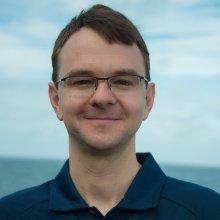
John Kessler
John Kessler and his lab investigate chemical oceanography with an emphasis on isotope biogeochemistry to elucidate methane and carbon dioxide dynamics within the oceanic system as well as across other Earth systems. They are driven to conduct this research by a desire to quantify feedbacks associated with global climate change. The oceanic methane and carbon dioxide systems are not only the largest global reservoirs of these greenhouse gases in active exchange with the atmosphere, but some of the largest global carbon reservoirs. Analytical chemistry and isotope (radio and stable) biogeochemistry measurements are conducted and used in regional geochemical models to quantify methane and carbon dioxide biogeochemical dynamics. Past projects investigated methane and carbon dioxide biogeochemistry in the Gulf of Mexico, Alaskan Arctic and Subarctic, Cariaco Basin, Black Sea, and Southern California Bight focusing on such natural features as methane clathrate hydrates, subsea permafrost, and hydrocarbon seeps as well as the biochemical processes in the water column that may enhance or limit its atmospheric release.
John Kessler has a BS in chemistry and mathematics from Gettysburg College and his MS and PhD in Earth System Science from the University of California, Irvine. He conducted postdoctoral research at Princeton University and was an assistant professor of oceanography at Texas A&M University before joining the faculty of the University of Rochester.
"The oceans control so many different aspects of life on this planet and our exploration of those controls are just at its infancy. I feel lucky and unworthy every time I have the privilege of conducting oceanographic research."
Expeditions
John participated in the following Ocean Exploration Trust expeditions:
